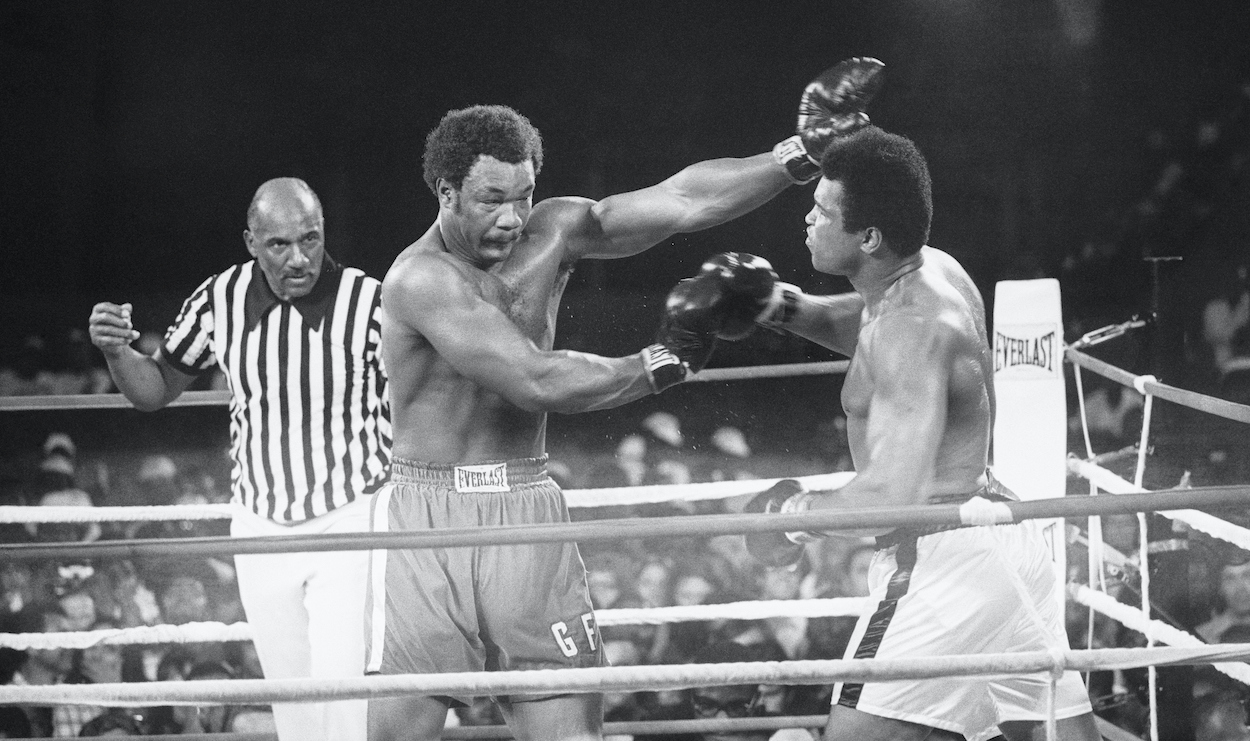Boxing
The Rumble in the Jungle Was a Fair Fight Because Both Muhammad Ali and George Foreman’s Camps Paid off the Ref

In one of the most famous boxing (and overall sporting) events of the 20th century, a 32-year-old Muhammad Ali knocked out 25-year-old George Foreman to win the Rumble in the Jungle and regain the heavyweight title.
There are many theories about what happened during this legendary event in Kinshasa, Zaire. Some credit Ali’s brilliant “rope-a-dope” strategy for the victory, while others, including Foreman himself, think there was foul play involved.
One thing is for sure, though. The ref, who is fascinatingly a Naismith Basketball Hall of Famer, played it right down the middle. How can we, and the participants, be sure that the ref stayed neutral during the fight? Because both sides bribed him to do so.
The Rumble in the Jungle had to take place outside the United States
Infamous boxing promoter Don King signed $5 million contracts with both George Foreman and Muhammad Ali for the two boxers to fight each other. These contracts helped protect King from having another promoter poach the two huge draws because, in 1974, no promoter in the U.S. could make a $10 million fight happen, including King.
That is why King took the fight overseas. To get that kind of money, King partnered with the African dictator Mobutu Sese Seko. He paid the fighters their purse personally, per History.com.
The fight went off at 4:30 a.m. local time to coincide with prime time in the States. Sixty thousand people were in the arena, and an estimated 50 million watched on TV. The crowd saw a classic fight where Ali’s “rope-a-dope” strategy led to Foreman tiring out in the eighth round. That’s when Ali scored the knockout, regaining his belt.
The man running these proceedings was referee Zack Clayton, whose backstory is just as interesting as Ali or Foreman. He made sure it was a fair fight… because both camps paid him to do just that.
Both Muhammad Ali and George Foreman’s camps paid off the ref

Ali biographer Jonathan Eig joined The Ryen Russillo Podcast to share some Muhammad Ali stories and talked about how both sides took care of Clayton before the Rumble in the Jungle.
Foreman said something like, ‘Well, we gave the ref 5,000 bucks to make sure they wouldn’t do anything crazy.’ Like, sometimes Foreman would hit somebody while they were on their way down just out of adrenaline.
He says, ‘We gave ’em 5,000 bucks just to make sure it would be a fair fight.’ And then Foreman said, ‘But I found out later that Ali gave the ref $10,000.’ And I called [Ali’s business manager] Gene Kilroy, and I told him that story, and Gene said, ‘That’s ridiculous! That’s the stupidest thing I ever heard! We only gave him five!'”
Jonathan Eig on the Rumble in the Jungle
For years, there have been stories that this happened prior to the fight, but Foreman always pushed the narrative that Ali paid more. Eig’s call with Kilroy suggests that both sides donated an equal amount to the ref’s wallet, so neither side should be able to complain.
The fact that Clayton took the cash from both sides is just another fascinating chapter in the life of a person who could easily lay claim to the title of the Most Interesting Man in the World.
Rumble in the Jungle referee Zack Clayton led an amazing life
Years before he officiated the Rumble in the Jungle (and took cash from both sides), Clayton had one of the most interesting sports careers of anyone in history.
As a young man, the 6-foot-1 point guard was known as the “Philly Phantom” or the “Black Bomber” for his long-range shooting, per The Undefeated. He played for the New York Renaissance, the first all-Black, Black-owned professional basketball team. His play on this historic team led to his induction into the Naismith Basketball Hall of Fame in 2017.
Clayton also played first base for several different Negro League clubs from 1932 to 1945 and was a member of the Harlem Globetrotters basketball team.
If this resume wasn’t enough, Clayton became a boxing ref after his playing days finished. He refereed many big fights like Ali-Foreman and Ali-Berbick in 1981.
He had an unbelievable career away from athletics as well. Clayton became a lieutenant for the Philadelphia fire department later in life. At other points, he was the chairman of the Pennsylvania State Athletic Commission and the director of Philadelphia’s gang control unit.
One more interesting note about Clayton is that he was known to drive through the City of Brotherly Love exclusively in his vehicle of choice, a black Cadillac. The money from the Foreman and Ali camps no doubt helped him afford his favorite ride.
Like Sportscasting on Facebook. Follow us on Twitter @sportscasting19











